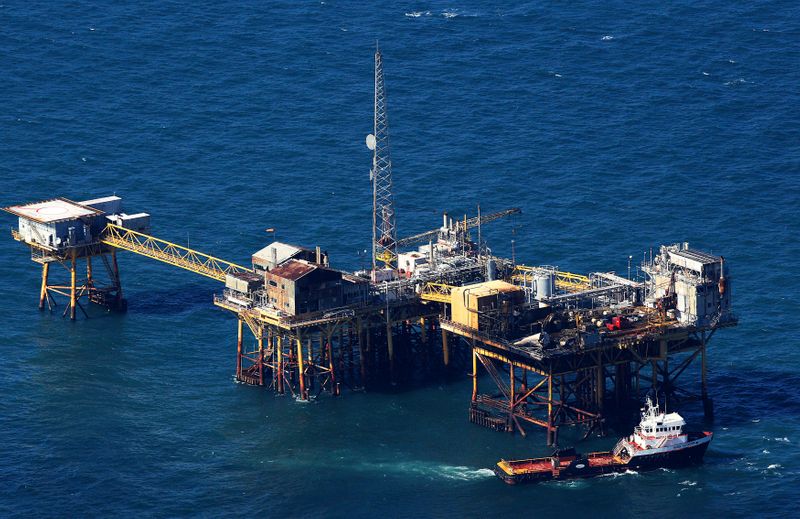HOUSTON (Reuters) – Oil producers on Saturday shut 13% of crude oil production ahead of tropical storms Laura and Marco that are forecast to grind up the Gulf of Mexico in coming days, U.S. government data showed.
Storms Marco and Laura are poised to become hurricanes and make back-to-back landfalls along the central Gulf Coast by mid-week. It is rare to have two simultaneously spinning in the Gulf and has raised concerns of double-barrel hits to coastal communities.
However, neither storm is expected to become a major hurricane, and their potential tracks cover a wide area of the Gulf Coast, said forecasters.
Murphy Oil Corp <MUR.N> and BHP <BHP.AX> on Saturday were evacuating some workers and Royal Dutch Shell Plc <RDSa.L> began shutting oil and gas production at most of its offshore operations. Murphy was making plans for possible production cuts, the company said.
BP Plc <BP.L> and Chevron Corp <CVX.N> began production shutdowns on Friday. Occidental Petroleum, the third largest Gulf of Mexico offshore producer, said it was implementing weather-related procedures.
Producers halted 240,785 barrels per day of oil production and 119 million cubic feet per day of natural gas output before noon on Saturday, said regulator U.S. Bureau of Safety and Environmental Enforcement.
Crews were evacuated from six production and four drilling rigs. Another seven drilling vessels were moved out of the storms’ paths, BSEE reported.
Storm Marco on Saturday was packing 65 mile per hour (100 km/h) winds, and was expected to become a Category One hurricane before making landfall in southeast Louisiana on Monday. Storm Laura is expected to become a Category One hurricane and reach the northern Gulf Coast a day or two after Marco.
“We don’t see the intensity and strengthening risk,” said Matt Rogers, president of Commodity Weather Group, which advises energy and agricultural firms. The prospect of either becoming a damaging, Category Three storm is just 10%, he said.
Unlike Hurricane Harvey, which struck the region three years ago, neither is expected to linger inland, he said, reducing risk of coastal flooding.
Helicopters on Saturday were crisscrossing the Gulf of Mexico, ferrying workers off platforms in precautionary measures, said Tony Hermans, base manager at Bristow Galliano heliport in southern Louisiana. Scheduled evacuations will be completed by Sunday, he said.
U.S. Gulf of Mexico offshore wells account for 17% of total U.S. crude oil production and 5% of total U.S. natural gas production. The region along the Texas to Mississippi coasts also accounts for 45% of total U.S. petroleum refining capacity.
Louisiana Offshore Oil Port, a major oil export and import terminal, reported it had begun implementing weather procedures.
(Reporting by Gary McWilliams and Erwin Seba; Editing by Daniel Wallis and Alistair Bell)
























